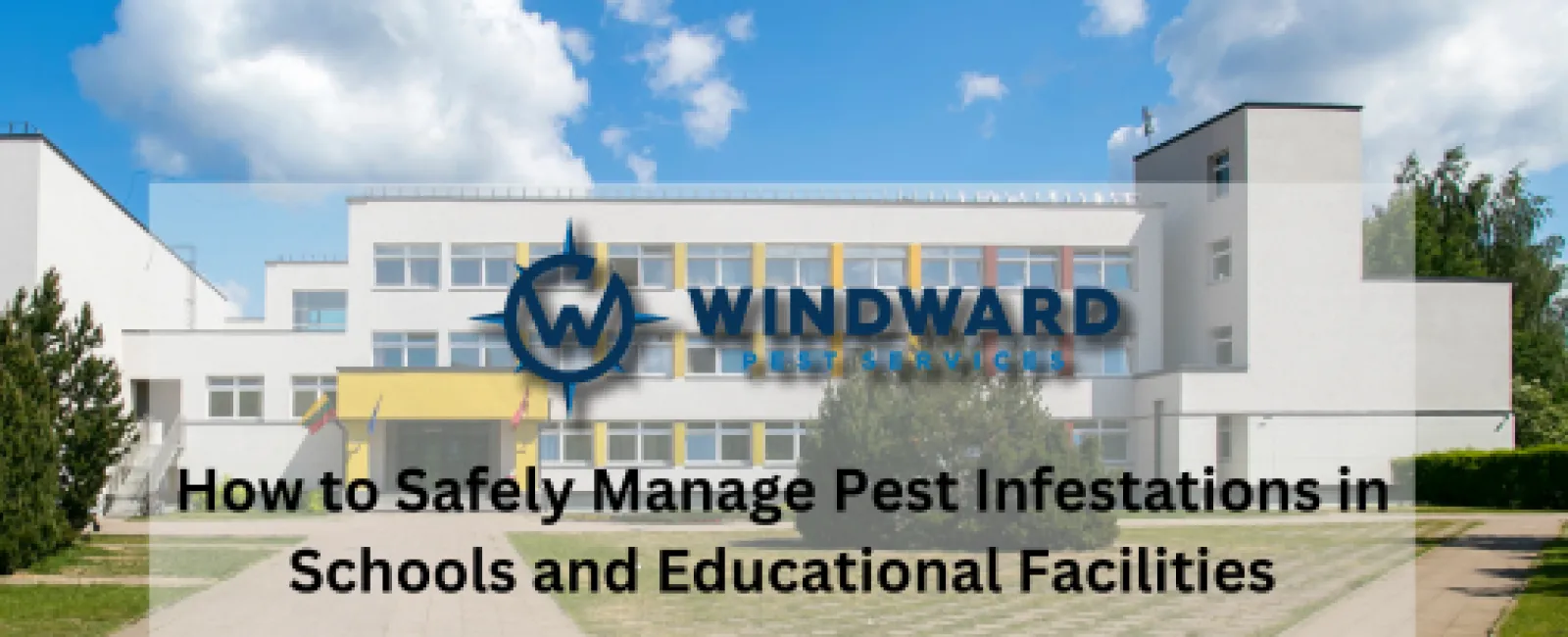When it comes to schools and educational facilities, maintaining a clean and safe environment is non-negotiable. Children, teachers, and staff rely on these spaces to foster learning, collaboration, and growth, but pest infestations can disrupt this delicate balance. Rodents, insects, and other pests not only compromise hygiene but also pose serious health risks. This makes proactive pest management essential for educational institutions.
In Atlanta, where humid summers and mild winters create an ideal breeding ground for pests, schools and other facilities face a year-round challenge. By partnering with professional services like Windward Pest Services, institutions can ensure effective pest control strategies that prioritize safety and compliance. In this blog, we'll explore how to safely manage pest infestations in schools, emphasizing preventative measures and reliable Atlanta pest control solutions, interior and exterior pest treatments, and quarterly services that keep pests at bay.
The Importance of Pest Management in Schools
Educational facilities are particularly vulnerable to pest infestations due to their size, high traffic, and the presence of food sources. Pests such as cockroaches, ants, termites, rodents, and mosquitoes can wreak havoc in classrooms, cafeterias, and outdoor spaces. They can:
- Spread harmful bacteria and diseases, including salmonella and hantavirus.
- Cause structural damage, especially from termites and rodents.
- Disrupt the learning environment with unpleasant odors and sightings.
- Trigger allergies and asthma, particularly in children.
These risks highlight the necessity for effective pest management. Schools must comply with local regulations to ensure the health and safety of all occupants. In Atlanta, partnering with pest control experts ensures adherence to safety protocols while leveraging advanced solutions like Atlanta interior and exterior pest treatments.
Signs of Pest Infestations in Schools
Early detection is key to addressing pest issues before they escalate. School administrators and staff should be vigilant for the following signs:
- Droppings or nests: Evidence of rodents or cockroaches in storage areas, classrooms, or kitchens.
- Damage to wood or furniture: Indicative of termite activity, which can weaken structures.
- Unusual odors: A musty or foul smell may signal a pest problem.
- Sightings: Regular sightings of pests during the day often indicate a more extensive infestation.
- Buzzing or bites: Mosquitoes in outdoor areas can cause significant disruptions during recess or after-school activities.
By educating staff on these warning signs, schools can address problems quickly and reduce health and safety risks.
Safe Pest Management Strategies
Implementing safe and effective pest management involves several steps. These include preventative measures, regular monitoring, and targeted treatments that minimize disruption to the school environment.
1. Integrated Pest Management (IPM)
IPM is a holistic approach that combines prevention, monitoring, and control strategies. It emphasizes long-term solutions that minimize the use of chemical pesticides. Key components include:
- Inspection and monitoring: Regular assessments by professionals like Windward Pest Services help identify vulnerabilities.
- Exclusion tactics: Sealing entry points, such as cracks and gaps, to keep pests out.
- Sanitation improvements: Ensuring that trash is removed promptly and food storage areas are clean and secure.
- Targeted treatments: Using the least toxic methods first, escalating only if necessary.
By employing IPM techniques, schools can achieve sustainable pest control while ensuring the safety of students and staff.
2. Routine Pest Control Services
Scheduling routine services, such as quarterly services offered by Windward Pest Services, helps keep pests under control year-round. These regular inspections and treatments address seasonal pest challenges common to Atlanta. For example:
- Spring and summer: Targeting mosquitoes and ants that thrive in warmer months.
- Fall and winter: Focusing on rodents and cockroaches seeking shelter indoors.
Routine services also include preventative measures to stop infestations before they occur.
3. Specialized Treatments for High-Risk Areas
Schools often contain areas that are particularly susceptible to pest activity, such as cafeterias, kitchens, storage rooms, and outdoor spaces. Specialized solutions, like interior and exterior pest treatments, target these areas effectively.
- Kitchen areas: Applying safe baiting systems to control cockroaches and ants without contaminating food.
- Playgrounds and outdoor spaces: Implementing mosquito services to reduce breeding grounds and protect children during outdoor activities.
- Storage and utility areas: Treating for termites and rodents to prevent structural damage.
Why Choose Professional Pest Control Services?
Professional pest control services, such as those provided by Windward Pest Services, offer numerous benefits that ensure schools remain pest-free:
- Expertise and experience: Knowledgeable technicians understand the unique challenges of pest control in Atlanta and use proven strategies to address them.
- Safety-first approach: Treatments are designed to minimize exposure to harmful chemicals, making them safe for children and staff.
- Comprehensive solutions: From termite coverage to mosquito services, professionals offer tailored solutions that address specific pest problems.
- Compliance with regulations: Professionals stay up-to-date with local and state laws, ensuring that pest management practices align with health and safety standards.
Preventative Measures for Schools
While professional services are essential, schools can also adopt preventative measures to reduce the risk of infestations:
- Maintain cleanliness: Regularly clean classrooms, kitchens, and storage areas to remove food and water sources.
- Proper waste management: Use sealed trash bins and dispose of garbage promptly.
- Seal entry points: Inspect and repair cracks, gaps, and other openings that could allow pests to enter.
- Monitor landscaping: Trim bushes, eliminate standing water, and keep outdoor areas tidy to discourage pest activity.
These proactive steps, combined with professional pest control services, provide a comprehensive defense against infestations.
Benefits of Quarterly Services for Schools
Schools in Atlanta benefit significantly from quarterly services provided by companies like Windward Pest Services. These regular treatments:
- Prevent seasonal pest outbreaks.
- Address emerging issues before they become major infestations.
- Reduce the need for emergency treatments, saving time and money.
- Provide peace of mind that the school environment is consistently safe and pest-free.
Protecting Against Termites and Mosquitoes
Two common challenges for Atlanta schools are termites and mosquitoes. Here's how professional services can help:
Termite Coverage: Termites can cause extensive damage to school structures, leading to costly repairs. Comprehensive termite coverage includes inspections, baiting systems, and preventative treatments to protect wooden structures.
Mosquito Services: Atlanta's warm climate makes mosquitoes a year-round concern. Targeted mosquito services reduce populations by eliminating breeding sites and applying eco-friendly treatments, ensuring outdoor spaces remain usable for students.
Pest management in schools and educational facilities is a crucial responsibility. Pests not only threaten the health and safety of students and staff but also compromise the integrity of the learning environment. By adopting a proactive approach that includes professional solutions like Atlanta pest control, interior and exterior pest treatments, and quarterly services, schools can stay ahead of infestations.
Companies like Windward Pest Services offer tailored, safe, and effective pest control strategies to address the unique needs of Atlanta's schools. From termite coverage to mosquito services, their expertise ensures a pest-free environment conducive to learning and growth.
Investing in comprehensive pest control is more than just a necessity—it's a commitment to the well-being of everyone who walks through the doors of an educational institution. Partner with professionals to safeguard your facility and provide peace of mind for parents, teachers, and students alike.

